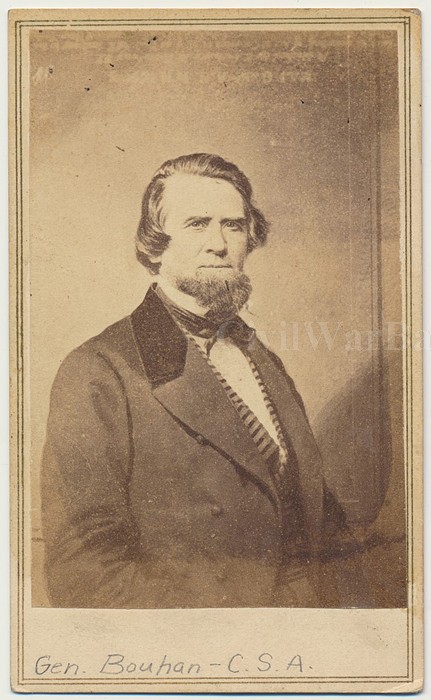BRIGADIER GENERAL MILLEDGE LUKE BONHAM
Item #: CWB12142
Click on an image to enlarge
Brigadier-General Milledge Luke Bonham was born near Red Bank,
Edgefield district, December 22, 1813, the son of Capt. James
Bonham, who came from Virginia to South Carolina about the
close of the last century, and married Sophie, daughter of
Jacob Smith, niece of Capt. James Butler, head of an
illustrious South Carolina family. The grandfather of General
Bonham was Maj. Absalom Bonham, a native of Maryland and a
soldier of the revolutionary war.
General Bonham, after graduation at the South Carolina
college, had his first military experience as a volunteer in
the company of Capt. James Jones, in the Seminole war, and was
promoted to brigade major, a position corresponding to
adjutant-general of brigade. Subsequently, while beginning
his career as a lawyer and legislator, he continued his
association with the militia and attained the rank of major-
general.
When war began with Mexico he went to the front as lieutenant-
colonel of the Twelfth United States infantry, and served with
distinction, earning promotion to colonel, and remained in
Mexico a year after the close of the war, as military governor
of one of the provinces.
Then returning home he resumed the practice of law, was
elected solicitor of the southern circuit, and in 1856, upon
the death of Preston S. Brooks, was chosen as the successor of
that gentleman in Congress.
Upon the secession of the State he promptly resigned and was
appointed commander-in-chief of the South Carolina army, with
the rank of major-general. In this capacity, and waiving all
questions of rank and precedence, at the request of Governor
Pickens, he served upon the coast in hearty cooperation with
General Beauregard, sent there by the provisional government
of the Confederate States.
At a later date he was commissioned brigadier-general in the
provisional army, and he took to Richmond the first troops,
not Virginian, that arrived for the defense of the capital.
His regiments were commanded by Colonels Kershaw, Williams,
Cash and Bacon, and were conspicuous in the operations before
Washington and in the first battle of Manassas.
Afterward, in consequence of a disagreement with the war
department, he resigned and was elected to the Confederate
Congress. In December, 1862, he was elected governor of the
State, an of office which he filled with credit.
In January, 1865, he was appointed to command of a brigade of
cavalry, in the organization of which he was engaged at the
close of military operations.
His subsequent career was marked by the same ardent
patriotism. As a delegate to President Grant from the
taxpayers' convention, and a supporter of the revolution of
1876, he rendered the State valuable service. He was the
first railroad commissioner of South Carolina, in 1878, and
subsequently chairman of the commission until his death,
August 27, 1890.
As a soldier he is described as "one of the finest looking
officers in the entire army. His tall, graceful figure,
commanding appearance, noble bearing and soldierly mien, all
excited the admiration and confidence of his troops. He wore
a broad-brimmed hat with a waving plume, and sat his horse
with the knightly grace of Charles the Bold or Henry of
Navarre. His soldiers were proud of him, and loved to do him
homage. While he was a good disciplinarian, so far as the
volunteer service required, he did not treat his officers with
any air of superiority."Shipping Weight:
0.45 lb
Item # CWB12142
$225.00 USD



